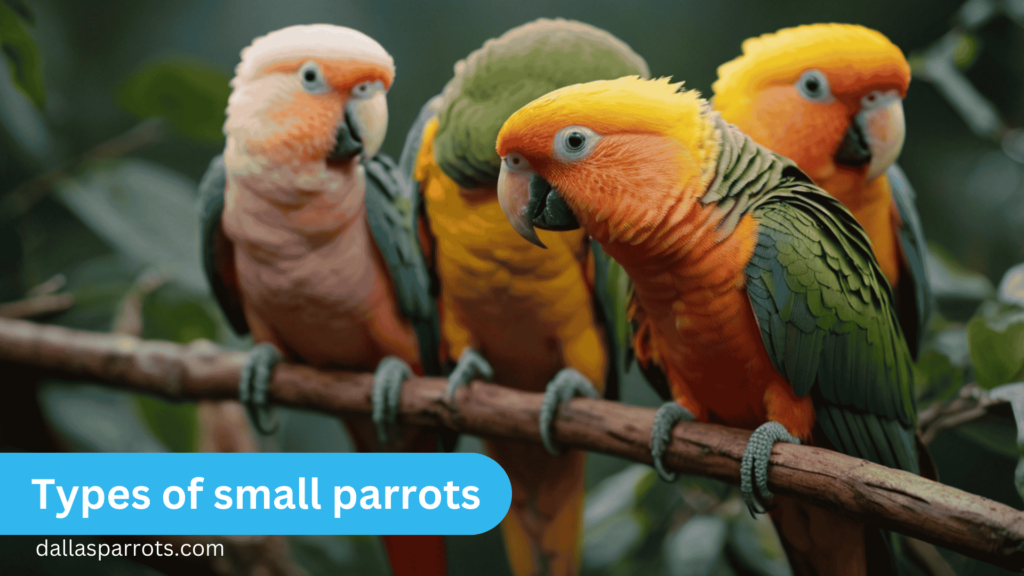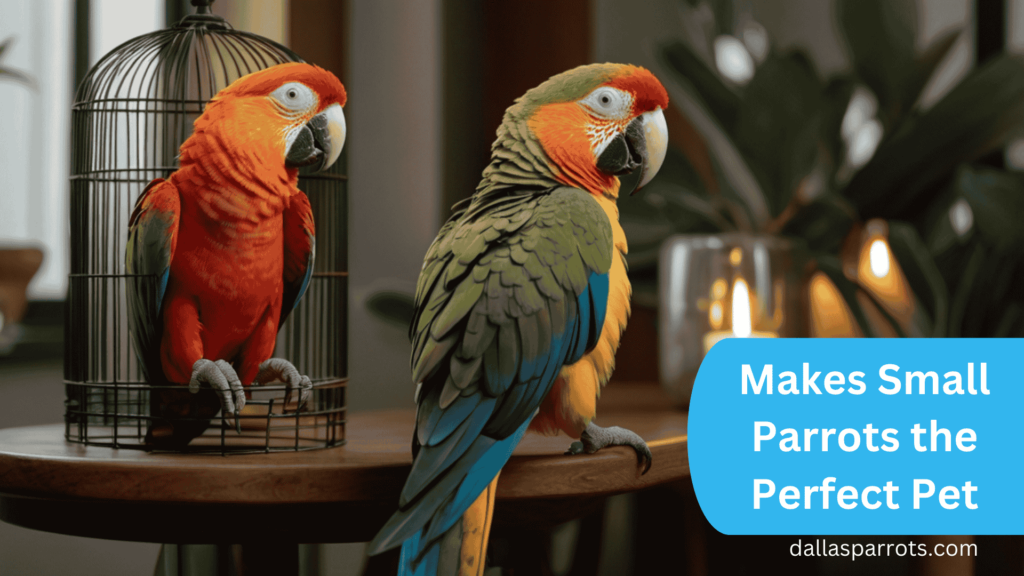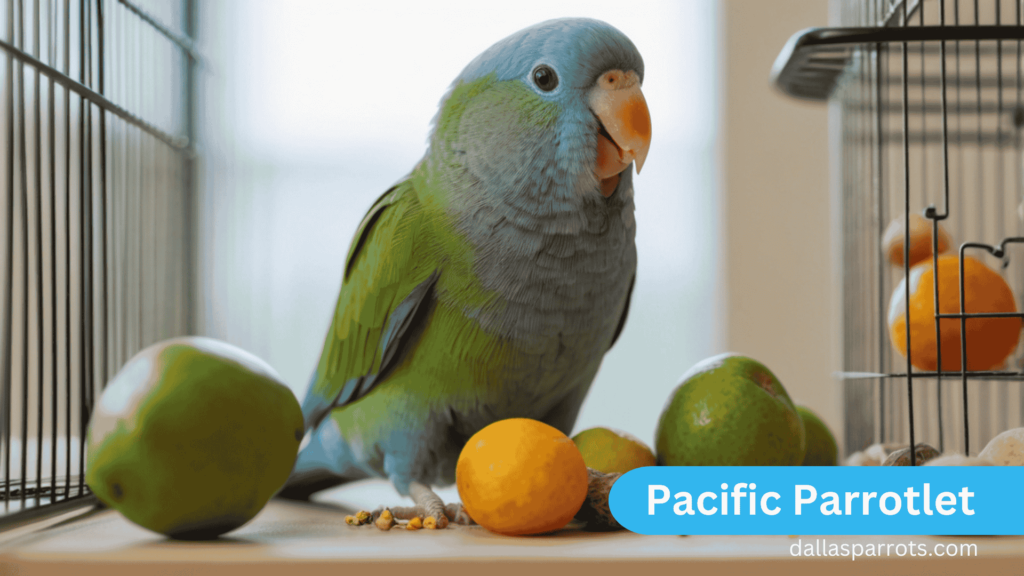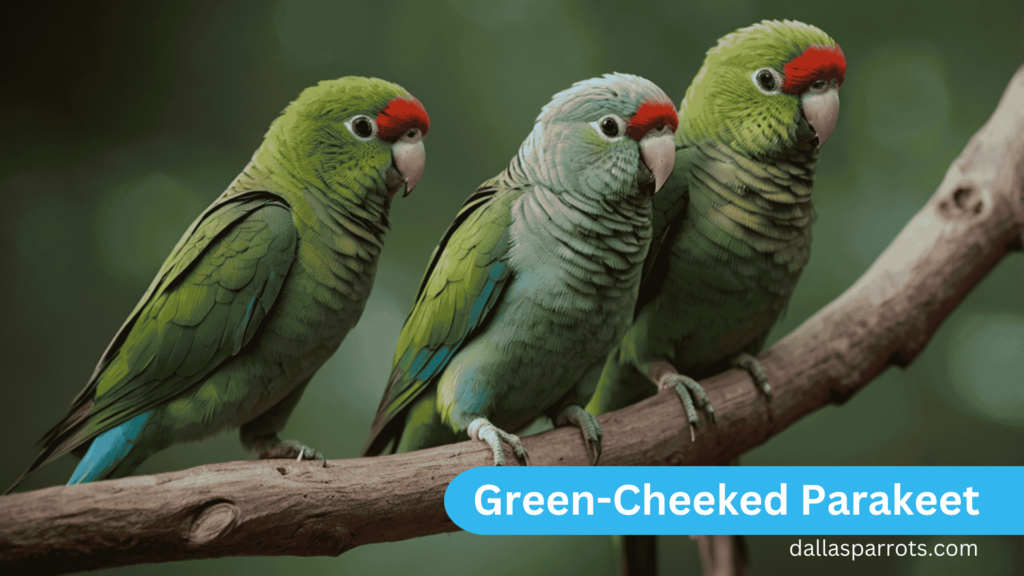

Types of small parrots That Will Brighten Your Day
Types of small parrots: Small parrots are a popular choice for pet owners because of their bright colors, cheerful nature, and intelligence. They are great companions that can easily adapt to apartment living, and their playful behavior brings joy to any home. Whether you’re new to birds or an experienced parrot owner, small parrots can fit into any lifestyle. In this guide, we will explore the characteristics of some of the most popular small parrot species, such as cockatiels, budgerigars, and lovebirds, and discuss what makes them special.
From easy care routines to their fun personalities, small parrots offer many benefits to their owners. We’ll cover everything from how to care for each species to tips on training and bonding with your bird. Each type of small parrot has unique qualities that can make them the perfect pet for your home. Whether you’re interested in the talkative cockatiel or the energetic budgie, this guide will help you find the right match for your family.
What Makes Small Parrots the Perfect Pet?
Small parrots are great pets because they don’t need a lot of space. They are perfect for people who live in apartments or places where space is limited. Even though they need a cage, it doesn’t take up much room in your home.

Another reason small parrots are perfect pets is that they are easy to take care of. They don’t need as much grooming or attention as larger birds. Their feeding and care routines are simple, making them a low-maintenance pet for busy people.
Small parrots are also very social and love spending time with their owners. They can form strong bonds with people and enjoy interacting. Some even learn to copy sounds and talk, making them fun and affectionate companions.
Cockatiels: The Friendly and Talkative Parrot
Cockatiels are one of the most popular small parrots, known for their gentle and friendly nature. They are easy to care for and love to bond with their owners. These cheerful birds enjoy playing with toys and often whistle, making them a joyful addition to any home.
Playful and Social Nature
Cockatiels are social and love attention. They enjoy sitting on their owners’ shoulders, playing with toys, and mimicking sounds. Their sweet whistles and playful behavior make them great companions.
Ideal for Beginners
Cockatiels are perfect for first-time bird owners. They are calm, easy to handle, and don’t require too much care. They can form strong bonds with their owners and respond well to training, like learning simple sounds or phrases.
Cockatiel Care
Cockatiels need a balanced diet of seeds, pellets, and fresh fruits. Regular exercise outside their cage helps keep them healthy. They also enjoy toys and need time out of their cage to stay happy. Clean their cage often and provide fresh water daily to keep them in good health.
Cockatiel Care Table
| Aspect | Recommendation |
|---|---|
| Diet | Seeds, pellets, fruits, and vegetables. |
| Exercise | Allow flight time outside the cage. |
| Socialization | Regular interaction with family members. |
| Cage Size | Spacious cage with perches and toys. |
| Grooming | Regular nail trimming and feather care. |
| Training | Train them to mimic sounds or simple commands. |
| Health | Monitor behavior and eating habits regularly. |
Cockatiels are playful, easy to care for, and great for bonding with their owners. They are ideal for those looking for a friendly, low-maintenance pet bird.
Pacific Parrotlet: The Tiny Parrot with a Big Personality
Despite being one of the smallest parrots, Pacific parrotlets are known for their bold and energetic personalities. These tiny birds are full of life and love interacting with their owners, making them a fun and lively companion.

Feisty and Energetic Nature
Pacific parrotlets are very active and love to engage in play. Their small size doesn’t stop them from being feisty and energetic, often showing excitement through playful antics. They are curious and like exploring their environment, so be sure to provide plenty of space for them to move around.
Training and Bonding
Though they are small, Pacific parrotlets are intelligent and can be trained with patience. They enjoy spending time outside their cage and bonding with their owners. They can learn to perform tricks or simple commands and love to interact with people. Consistent training helps build trust and strengthens the bond between you and your parrotlet.
Pacific Parrotlet Care
For optimal care, Pacific parrotlets need a spacious cage that allows them to move around comfortably. Providing toys for mental stimulation is crucial as they are very intelligent and need challenges to stay engaged. A varied diet of seeds, pellets, and fresh fruits ensures they remain healthy and active. Regular exercise outside the cage is also important to keep them happy.
Pacific Parrotlet Care Table
| Aspect | Recommendation |
|---|---|
| Diet | Seeds, pellets, fresh fruits, and vegetables. |
| Exercise | Allow time outside the cage for flight and play. |
| Socialization | Enjoys spending time with owners and being social. |
| Cage Size | Spacious cage with room for movement and perches. |
| Grooming | Regular nail trimming and feather care. |
| Training | Train with patience to perform tricks or mimic sounds. |
| Health | Monitor their behavior and ensure they eat a balanced diet. |
Pacific parrotlets are small, but their big personalities make them wonderful pets. With proper care, training, and social interaction, they will become a lively and affectionate part of your family.
Budgerigar: The Affordable and High-spirited Parrot
Budgerigars, also known as budgies, are among the most popular small parrots due to their playful nature, vibrant colors, and friendly personalities. If you’re considering getting a parrot, budgies are a fantastic choice—especially for first-time bird owners. Their small size, combined with a high-energy personality, makes them great companions for both kids and adults.
Sociable and Friendly Nature
Budgies are known for their sociable and affectionate behavior. They love interacting with their owners, often hopping around in their cages, chirping away, and seeking attention. One of their most charming traits is their ability to mimic sounds, and many budgies can even learn to speak a few words. Their friendly and outgoing nature makes them excellent companions, always ready to entertain and engage with their humans.
Ideal for Beginners
If you’re new to owning birds, budgies are a wonderful choice. They are not only affordable but also relatively easy to care for. They have a calm temperament and require less maintenance compared to some other parrot species. Budgies are perfect for those who want the joy of a pet parrot but don’t want to deal with overly complicated care routines. Plus, they are small and don’t need an excessive amount of space, making them ideal for apartment living.
Budgie Care Tips
Taking care of a budgie is simple but important to ensure their happiness and health. Here’s a quick guide to budgie care:
- Diet: A balanced diet is key to keeping your budgie healthy. Provide a mix of seeds, pellets, and fresh vegetables like spinach, carrots, and apples. Fresh water should always be available.
- Exercise: Budgies are active birds and need plenty of space to move around. A large cage with perches and toys will allow your budgie to stay physically fit. Giving them time outside the cage to fly and explore will help prevent boredom and keep them happy.
- Socialization: Budgies thrive on social interaction, so it’s essential to spend time with them daily. They will bond with their owners and can even learn tricks or words.
- Cage Size: Choose a spacious cage for your budgie. The larger the better, as they need room to fly and play. Make sure the bars are close enough together to prevent them from escaping.
Fun Facts About Budgies
- Life Expectancy: Budgies can live up to 10 years, and with proper care, some have been known to live even longer.
- Mimicry: Budgies are one of the best mimics among small parrots. They can replicate sounds and words, making them highly entertaining.
- Playful Personalities: Budgies love playing with toys and engaging in social activities. Their playful nature brings joy to any household.
Budgie Care Table
| Aspect | Recommendation |
|---|---|
| Diet | Seeds, pellets, fresh vegetables, and occasional fruits. |
| Exercise | Provide plenty of space for flying in their cage. Allow outside time. |
| Socialization | Budgies enjoy interaction and thrive with social contact. |
| Cage Size | A large cage is essential for movement and exercise. |
| Training | Budgies are highly trainable and can learn to mimic sounds. |
| Health | Regularly monitor their behavior and ensure proper nutrition. |
Budgies, with their playful and sociable nature, make a wonderful pet. Whether you’re a first-time bird owner or an experienced parrot lover, budgies are sure to bring joy and excitement into your life. Their easy care requirements, combined with their engaging personalities, make them a great companion for anyone looking to brighten up their home.
Green-Cheeked Parakeet: A Calm and Affectionate Companion
The green-cheeked parakeet is an excellent choice if you want a calm, loving, and easy-to-care-for bird. These small parrots are known for their friendly nature and quieter personalities, making them a wonderful companion for anyone looking for a pet that is not too noisy.

Loving and Quiet Nature
Green-cheeked parakeets are one of the quieter parrot species, making them a great option for people who live in apartments or prefer a less noisy pet. While they can still chirp and make sounds, they tend to be much quieter compared to other small parrots, like budgies or cockatiels. Their gentle nature means they enjoy spending time with their owners and often form strong, affectionate bonds.
Easy to Train and Smart
These parrots are very intelligent and can quickly learn new tricks or words. Green-cheeked parakeets are responsive to positive reinforcement, meaning you can teach them fun behaviors and commands over time. They love attention from their owners and enjoy being mentally stimulated, which makes training an enjoyable process for both the bird and the owner.
Care Tips for Green-Cheeked Parakeets
Taking care of a green-cheeked parakeet is straightforward but requires attention to their physical and emotional needs:
- Diet: A healthy diet is important. Offer a mix of high-quality pellets, seeds, and fresh fruits like apples or berries. They also enjoy vegetables like spinach and carrots.
- Exercise: Green-cheeked parakeets are active birds and need space to move around. Make sure their cage is large enough for them to spread their wings. Allowing them time outside their cage will help them stay fit and happy.
- Social Interaction: These parrots thrive on interaction with their owners. Spend quality time with them each day to build a strong bond.
- Cage Setup: Provide a spacious cage with multiple perches and toys to keep your bird entertained and mentally stimulated.
Fun Facts About Green-Cheeked Parakeets
- Life Expectancy: Green-cheeked parakeets typically live for 15 to 20 years, making them long-term companions.
- Personality: Despite their calm demeanor, they are playful and enjoy exploring their surroundings.
- Mimicry: Green-cheeked parakeets can mimic sounds and even learn words, though they are not as vocal as other parrot species.
Green-Cheeked Parakeet Care Table
| Aspect | Recommendation |
|---|---|
| Diet | High-quality pellets, seeds, fresh fruits, and vegetables. |
| Exercise | A large cage for flying and regular outside time. |
| Socialization | They love interaction and form close bonds with their owners. |
| Training | Quick learners that enjoy mental stimulation. |
| Health | Regularly check for signs of illness and provide a balanced diet. |
Senegal Parrot: The Smart and Sassy Small Parrot
Senegal parrots are fun, smart, and full of personality. These small birds form strong bonds with their owners and are very affectionate.
Senegal parrots are intelligent and love to learn new tricks. They enjoy being active, and their playful antics make them a fun addition to any home. These birds enjoy spending time with their owners and can become very attached over time. They are quiet compared to other parrots, making them a good choice for those who want a less noisy pet.
For proper care, Senegal parrots need a balanced diet of pellets, seeds, and fresh fruits. Regular exercise outside the cage is essential for their health, and they love playing with toys. Social interaction is also important, as they enjoy spending time with their owners. Providing mental stimulation through puzzles or activities will keep them happy and engaged.
Senegal Parrot Care Table
| Aspect | Recommendation |
|---|---|
| Diet | Balanced diet of pellets, seeds, and fresh fruits & veggies. |
| Exercise | A spacious cage and regular time outside to fly and play. |
| Socialization | They love interacting with their owners. |
| Mental Stimulation | Provide toys and activities to keep their minds active. |
| Health | Regularly check for signs of illness and provide a varied diet. |
Senegal parrots are a great choice for anyone looking for a fun, loving, and intelligent companion. With the right care and attention, they will be happy and thrive for many years.
Bourke’s Parrot: A Sweet-Natured and Quiet Parrot
The Bourke’s parrot is a perfect choice for anyone who wants a quiet, gentle companion. Known for their calm and sweet nature, these parrots are ideal for families or individuals who prefer a more laid-back pet.
Bourke’s parrots are gentle and friendly, making them great companions for those who enjoy a quieter bird. Unlike other parrots, they are known for their soft chirps, which are not disruptive. This makes them a wonderful choice for those who live in apartments or prefer a less noisy bird.
For proper care, Bourke’s parrots need a balanced diet and regular social interaction. Offering them a variety of toys and opportunities for exercise will help keep them happy. Providing a calm environment and regular bonding time will also strengthen the bond with your bird.
Bourke’s Parrot Care Table
| Aspect | Recommendation |
|---|---|
| Diet | A balanced diet of fresh fruits, pellets and seeds . |
| Exercise | Space to fly and play outside the cage. |
| Socialization | Bourke’s parrots enjoy being around their owners. |
| Sound Level | Soft chirps, less noisy compared to other parrots. |
| Health | Regular health checks and proper nutrition. |
Choosing the Right Small Parrot for Your Home
When choosing a small parrot for your home, it’s important to think about the bird’s personality and how active it is. Some small parrots, like budgies and cockatiels, are very energetic and enjoy a lot of playtime. Others, like Bourke’s parrot, are more relaxed and need less activity.
Another thing to think about is how loud the bird is. If you live in an apartment or want a quieter pet, choose birds like the Bourke’s parrot or green-cheeked parakeet, which are not very noisy. Make sure you also have the time and space to care for your new pet, including providing the right food, a proper cage, and enough attention.
Training and Socializing Your Small Parrot
Training and socializing your small parrot is key to building a strong bond with them. Small parrots, like budgies and cockatiels, are quick learners and can be trained with the right approach. Using treats as rewards is a great way to encourage good behavior and help them learn faster.
Spending time outside the cage is also important for socialization. It gives your parrot the chance to interact with you, which strengthens the connection between you two. Start training when your parrot is young, and always be patient and consistent. This will help your parrot feel comfortable and learn new tricks.
Feeding Your Small Parrot: A Diet for Health and Happiness
Feeding your small parrot a balanced diet is essential for their health and happiness. A good diet includes a mix of high-quality pellets and seeds, which provide the right balance of nutrients. These foods help keep your parrot strong and energetic. Along with pellets and seeds, offering fresh fruits and vegetables is important to provide additional vitamins and minerals. Some great options include apples, carrots, and leafy greens like spinach and kale.
It’s also important to avoid toxic foods that could harm your parrot. Never feed your parrot chocolate, avocado, or caffeine, as these can be harmful and even deadly. A healthy, varied diet will help your parrot stay happy, active, and healthy for many years.
| Food Type | Examples | Importance |
|---|---|---|
| Pellets and Seeds | High-quality pellets, sunflower seeds | Provide essential nutrients and energy |
| Fresh Fruits and Veggies | Apples, carrots, spinach, kale | Add vitamins, fiber, and minerals to the diet |
| Toxic Foods to Avoid | Chocolate, avocado, caffeine | Harmful and can cause health issues |
Common Health Issues in Small Parrots and How to Prevent Them
Small parrots, like any pets, can experience health issues. However, many of these can be prevented or managed with the right care and attention. Here are some of the most common health problems that small parrots face:
- Feather Plucking: This is a common behavioral issue, often linked to stress, boredom, or even nutritional deficiencies. Parrots that are not given enough attention or stimulation may begin plucking their feathers, which can lead to skin damage. It is essential to keep your parrot mentally engaged with toys and regular interaction.
- Respiratory Infections: Small parrots can be sensitive to changes in their environment, particularly to dust, smoke, and poor ventilation. Keeping their living area clean, ensuring good air circulation, and avoiding strong chemical odors can help prevent respiratory issues. If you notice coughing or difficulty breathing, a vet visit is necessary.
- Parasites and Infections: Parasites like mites, lice, and bacteria can infect small parrots. Regular checkups with a vet are crucial to detect and treat such issues early. Good hygiene practices and keeping the cage clean are essential for preventing infections.
Maintaining a clean environment, providing a balanced diet, and giving your parrot plenty of attention will help keep these health problems at bay. Regular vet checkups are also vital in catching any issues before they become serious.
The Social Life of Small Parrots: Why They Thrive on Interaction
Small parrots are highly social creatures and thrive on constant interaction. Unlike some pets that are more independent, small parrots need regular engagement from their owners to feel happy and secure. These birds are incredibly affectionate and enjoy the companionship of their humans, as well as other birds. By spending time with them each day, you can help strengthen the bond between you and your parrot, making them feel loved and less lonely.
For example, many small parrots, like budgies and lovebirds, are known for their playful nature and enjoy interacting with both humans and other birds. If you are considering getting a second parrot, it can be a great way to keep them entertained and prevent boredom, especially when you are not around. However, it’s important to ensure that you can care for multiple birds, as they will need attention, space, and proper care to maintain their health and happiness. Regular interaction is key to making sure your small parrot remains emotionally satisfied and well-adjusted.
Also visit our Instagram: Click Here
FAQ’s
What are small parrots called?
Small parrots are often called parakeets, parrotlets, budgies, or cockatiels. These names refer to different types of small parrots that are popular as pets.
What is the best small parrot?
The best small parrot depends on what you are looking for. Cockatiels, budgies, and green-cheeked parakeets are great choices for beginners. They are friendly, easy to care for, and enjoy interacting with their owners.
What were 100 parrots called?
There isn’t a special name for 100 parrots. However, a group of parrots is sometimes called a “pandemonium.”
What type of parrot lives the shortest?
The parrot that usually lives the shortest is the budgie. They typically live around 5 to 8 years, although some can live longer with good care.
Do mini parrots talk?
Yes, some mini parrots, like budgies and cockatiels, can learn to talk. They may not speak as much as larger parrots, but they can mimic sounds and words.
Which parrot is female?
Both male and female parrots exist in many species. There isn’t one specific parrot that is female. It depends on the bird’s sex, which can sometimes be hard to tell without a DNA test.
Which parrot can talk fast?
Budgies are known to be able to talk fast. They are excellent mimics and can learn to speak quickly, especially when trained early.
Are small parrots smart?
Yes, small parrots are very smart! They can learn tricks, recognize their owners, and even mimic sounds or words. Some, like budgies and cockatiels, are especially known for their intelligence.
What is the cheapest type of parrot?
The cheapest type of parrot is usually the budgie. They are small, common, and easy to care for, making them affordable for most people.


